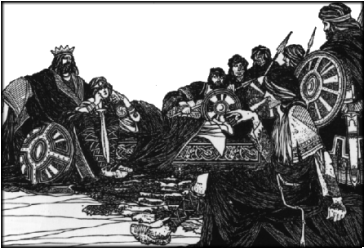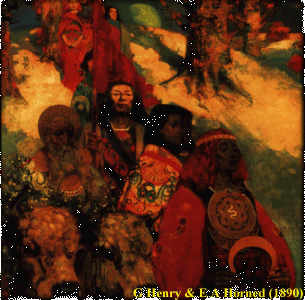- Historical
section: The Celtic Tribe
This area of the page is devoted to the study
of the various Celtic races and how they warred or allied with
each other. It also included where possible, details of their
general appearance and origins of their ancestors.
The sources of the quoted passages (quoted text
is green script) are listed in the Bibliography.
INDEX
- Topic 1 An Ri and the Deribhfhine
- Topic 2 The Aos Dana
- Topic 3 The Nobles
- Topic 1
- An Ri and the
Deribhfhine. Back to the
Index.
 The Celtic tribe was known as the
Tuath. There were roughly 150 such Tuatha in Ireland.
Each Tuath was governed over by it's Ri (their King or
Chieftain). The King was selected from the Deribhfhine
(extended royal family). The Deribhfhine included his
cousins, aunts & uncles, grandparents, and his
parents and brothers and sisters. Within the Tuath, the
Deribhfhine were of great importance. There were strict
rules of conduct governing the daily activities of the
chief: "Sunday is for drinking ale, for he is not
a lawful chief who does not give ale every Sunday. Monday
is for judgement, for the good of the people. Tuesday is
for chess. Wednesday is for seeing greyhounds coursing.
Thursday is for marriage duties. Friday is spent at horse
racing. Saturday is for giving judgements." -extract from the ancient
Law tracts, duties of a King during peace time.
The Celtic tribe was known as the
Tuath. There were roughly 150 such Tuatha in Ireland.
Each Tuath was governed over by it's Ri (their King or
Chieftain). The King was selected from the Deribhfhine
(extended royal family). The Deribhfhine included his
cousins, aunts & uncles, grandparents, and his
parents and brothers and sisters. Within the Tuath, the
Deribhfhine were of great importance. There were strict
rules of conduct governing the daily activities of the
chief: "Sunday is for drinking ale, for he is not
a lawful chief who does not give ale every Sunday. Monday
is for judgement, for the good of the people. Tuesday is
for chess. Wednesday is for seeing greyhounds coursing.
Thursday is for marriage duties. Friday is spent at horse
racing. Saturday is for giving judgements." -extract from the ancient
Law tracts, duties of a King during peace time.
- The Kings duties were to
lead his people at all times. During times of war or
during the numerous cattle raids on neighbouring Tuatha,
the King would lead his warriors into battle and gain
glory and fame if the battle went well. In peace time,
the King was in charge of the tribal assembly. Here he
settled disputes and handed down suitable punishment to
criminals.
- Because of his great
importance within the Tuath and his peoples complete
dependence upon him, he had to be physically perfect. No
blind or crippled man could become King. If disabled in
battle the King had to give up his Kingship (see the story of King Nuada of the silver hand).
-
- Topic 2
- The Aos Dana. Back to the Index.
-
 The Aos Dana were skilled men of the
tribe, trained in their respective professions. They were
needed by the tribe and therefore had a high social
status and could pass safely through out the country from
Tuath to Tuath. They were always well treated by every
tribe's King and nobles.
The Aos Dana were skilled men of the
tribe, trained in their respective professions. They were
needed by the tribe and therefore had a high social
status and could pass safely through out the country from
Tuath to Tuath. They were always well treated by every
tribe's King and nobles. -
- Druids, Druids were multi-purpose professionals:
doctors, priests and magicians but all in one person.
Mainly though, they were pagan magicians and had
knowledge of science and magic, they were skilful in the
arts of healing, divination and most importantly, they
were adepts in magic. They had to study for a minimum of
twenty years before they became true Druids. They
conducted many ceremonies such as burial rites or
celebration of the coming of a new season (e.g. Summer
salstas). In some cases they conclude their King e.g.
when Cathbad foretold that Deirdre would bring woe upon
the King.
 Fili, The Fili were poets who had undergone
seven years of training. They were employed by Kings to
record their great deeds. A File could always expect
generous pay from his King and presents from any other
King he visited, for if he did not, he composed a Satire.
This was a verse which made the King out to be a fool.
The Fili were free of fear of Kings (even if the King he
visited was warring with his own) and were respected the
other Aos Dana and the Nobles.
Fili, The Fili were poets who had undergone
seven years of training. They were employed by Kings to
record their great deeds. A File could always expect
generous pay from his King and presents from any other
King he visited, for if he did not, he composed a Satire.
This was a verse which made the King out to be a fool.
The Fili were free of fear of Kings (even if the King he
visited was warring with his own) and were respected the
other Aos Dana and the Nobles.
- Craftsmen, They were the Tuath's carpenters and
blacksmiths etc. Skilled in their trade, they were
responsible for the Tuath's weapons and equipment, they
also constructed the tribal buildings.
-
-
- Topic 3
- The Nobles. Back to the Index.
-
 The Nobles were the warriors of the Tuath
and held the same social status as the Aos Dana. In a
similar fashion to the feudal system, the Nobles owned
cattle herds and much land, yet did not themselves tend
to it. Cattle were an indication of a nobleman's power
within the Tuath. Therefore, the greater number of cattle
in his herd, the more important the noble. Divisions of
their land and a part of their cattle herd they gave to
poor farmers to harvest and tend, in return for crops and
services. It was a nobleman's duty to protect his farmers
during war time.
The Nobles were the warriors of the Tuath
and held the same social status as the Aos Dana. In a
similar fashion to the feudal system, the Nobles owned
cattle herds and much land, yet did not themselves tend
to it. Cattle were an indication of a nobleman's power
within the Tuath. Therefore, the greater number of cattle
in his herd, the more important the noble. Divisions of
their land and a part of their cattle herd they gave to
poor farmers to harvest and tend, in return for crops and
services. It was a nobleman's duty to protect his farmers
during war time.
 The Celtic tribe was known as the
Tuath. There were roughly 150 such Tuatha in Ireland.
Each Tuath was governed over by it's Ri (their King or
Chieftain). The King was selected from the Deribhfhine
(extended royal family). The Deribhfhine included his
cousins, aunts & uncles, grandparents, and his
parents and brothers and sisters. Within the Tuath, the
Deribhfhine were of great importance. There were strict
rules of conduct governing the daily activities of the
chief: "Sunday is for drinking ale, for he is not
a lawful chief who does not give ale every Sunday. Monday
is for judgement, for the good of the people. Tuesday is
for chess. Wednesday is for seeing greyhounds coursing.
Thursday is for marriage duties. Friday is spent at horse
racing. Saturday is for giving judgements." -extract from the ancient
Law tracts, duties of a King during peace time.
The Celtic tribe was known as the
Tuath. There were roughly 150 such Tuatha in Ireland.
Each Tuath was governed over by it's Ri (their King or
Chieftain). The King was selected from the Deribhfhine
(extended royal family). The Deribhfhine included his
cousins, aunts & uncles, grandparents, and his
parents and brothers and sisters. Within the Tuath, the
Deribhfhine were of great importance. There were strict
rules of conduct governing the daily activities of the
chief: "Sunday is for drinking ale, for he is not
a lawful chief who does not give ale every Sunday. Monday
is for judgement, for the good of the people. Tuesday is
for chess. Wednesday is for seeing greyhounds coursing.
Thursday is for marriage duties. Friday is spent at horse
racing. Saturday is for giving judgements." -extract from the ancient
Law tracts, duties of a King during peace time. The Aos Dana were skilled men of the
tribe, trained in their respective professions. They were
needed by the tribe and therefore had a high social
status and could pass safely through out the country from
Tuath to Tuath. They were always well treated by every
tribe's King and nobles.
The Aos Dana were skilled men of the
tribe, trained in their respective professions. They were
needed by the tribe and therefore had a high social
status and could pass safely through out the country from
Tuath to Tuath. They were always well treated by every
tribe's King and nobles.  Fili, The Fili were poets who had undergone
seven years of training. They were employed by Kings to
record their great deeds. A File could always expect
generous pay from his King and presents from any other
King he visited, for if he did not, he composed a Satire.
This was a verse which made the King out to be a fool.
The Fili were free of fear of Kings (even if the King he
visited was warring with his own) and were respected the
other Aos Dana and the Nobles.
Fili, The Fili were poets who had undergone
seven years of training. They were employed by Kings to
record their great deeds. A File could always expect
generous pay from his King and presents from any other
King he visited, for if he did not, he composed a Satire.
This was a verse which made the King out to be a fool.
The Fili were free of fear of Kings (even if the King he
visited was warring with his own) and were respected the
other Aos Dana and the Nobles. The Nobles were the warriors of the Tuath
and held the same social status as the Aos Dana. In a
similar fashion to the feudal system, the Nobles owned
cattle herds and much land, yet did not themselves tend
to it. Cattle were an indication of a nobleman's power
within the Tuath. Therefore, the greater number of cattle
in his herd, the more important the noble. Divisions of
their land and a part of their cattle herd they gave to
poor farmers to harvest and tend, in return for crops and
services. It was a nobleman's duty to protect his farmers
during war time.
The Nobles were the warriors of the Tuath
and held the same social status as the Aos Dana. In a
similar fashion to the feudal system, the Nobles owned
cattle herds and much land, yet did not themselves tend
to it. Cattle were an indication of a nobleman's power
within the Tuath. Therefore, the greater number of cattle
in his herd, the more important the noble. Divisions of
their land and a part of their cattle herd they gave to
poor farmers to harvest and tend, in return for crops and
services. It was a nobleman's duty to protect his farmers
during war time.